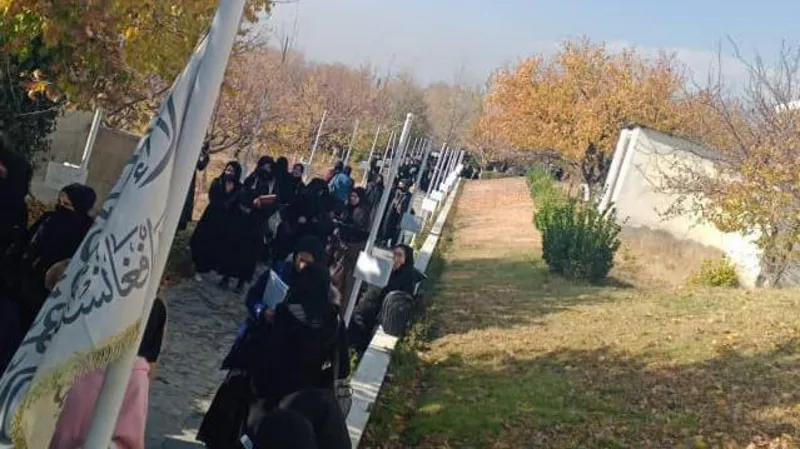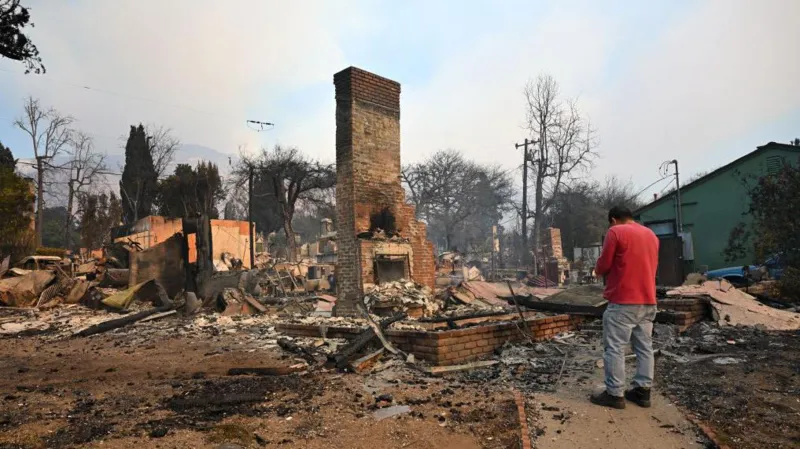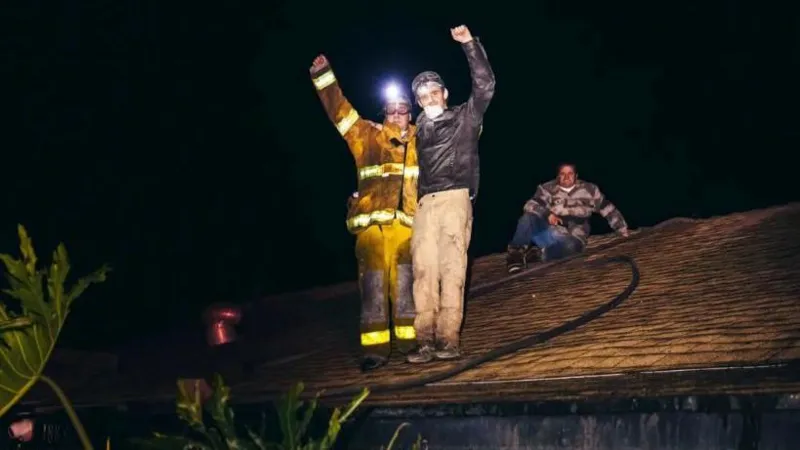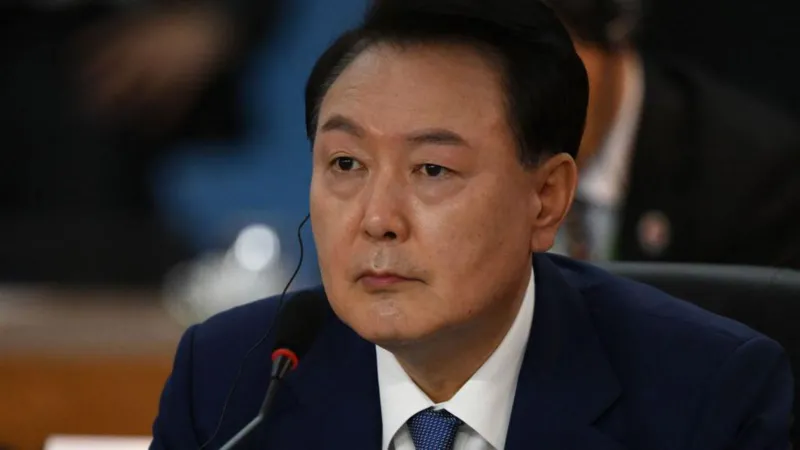International
Afghan women ‘banned from midwife courses’ in latest blow to rights

Women training as midwives and nurses in Afghanistan have told the BBC they were ordered not to return to classes in the morning – effectively closing off their last route to further education in the country.
Five separate institutions across Afghanistan have also confirmed to the BBC that the Taliban had instructed them to close until further notice, with videos shared online showing students crying at the news.
The BBC has yet to confirm the order officially with the Taliban government’s health ministry.
However, the closure appears to be in line with the group’s wider policy on female education, which has seen teenage girls unable to access secondary and higher education since August 2021.
The Taliban have repeatedly promised they would be readmitted to school once a number of issues were resolved – including ensuring the curriculum was “Islamic”.
This has yet to happen.
One of the few avenues still open to women seeking education was through the country’s further education colleges, where they could learn to be nurses or midwives.
Midwifery and nursing are also one of the only careers women can pursue under the Taliban government’s restrictions on women – a vital one, as male medics are not allowed to treat women unless a male guardian is present.
Just three months ago, the BBC was given access to one Taliban-run midwife training centre, where more than a dozen women in their 20s were learning how to deliver babies.
The women were happy to have been given the chance to learn.
“My family feels so proud of me,” a trainee called Safia said. “I have left my children at home to come here, but they know I’m serving the country.”
But even then, some of the women expressed fear about whether even this might be stopped eventually.
What will happen to those women – and another estimated 17,000 women on training courses – is unclear.
No formal announcement has been made, although two sources in the Ministry of Health confirmed the ban to BBC Afghan off the record.
In videos sent to the BBC from other training colleges, trainees can be heard weeping.
“Standing here and crying won’t help,” a student tells a group of women in one video. “The Vice and Virtue officials [who enforce Taliban rules] are nearby, and I don’t want anything bad to happen to any of you.”
Other videos shared with the BBC show women quietly protesting as they leave the colleges – singing as they make their way through the hallways.
One Kabul student said she had been told to “wait until further notice”.
“Even though it is the end of our semester, exams have not yet been conducted, and we have not been given permission to take them,” she told the BBC.
Another student revealed they “were only given time to grab our bags and leave the classrooms”.
“They even told us not to stand in the courtyard because the Taliban could arrive at any moment, and something might happen. Everyone was terrified,” she said. “For many of us, attending classes was a small glimmer of hope after long periods of unemployment, depression, and isolation at home.”
What this means for women’s healthcare also now remains to be seen: last year, the United Nations said Afghanistan needed an additional 18,000 midwives to meet the country’s needs.
Afghanistan already has one of the worst maternal mortality rates in the world, according to the World Health Organization (WHO), with a report released last year noting 620 women were dying per 100,000 live births.
International
LA fire victims fear new housing crisis

Michael Storc and his family had just survived a devastating wildfire.
Now they have to face a daunting new challenge that he had hoped to never experience again – the Los Angeles housing market.
After losing the Altadena home that he owned in the Eaton fire, he was scouring for a new place to rent, and having little luck.
“What’s available is not nice at all and the rents have gone up a lot,” Mr Storc told the BBC. “I told my teenage daughter we had to accept we would live somewhere not very nice.”
The Los Angeles area already has one of the most expensive real estate markets in the country. And with thousands now displaced by the Palisades and Eaton fires, Angelenos are anxious that the sudden surge in demand could make rents and home prices soar even higher.
California has an anti-price gouging law that prevents landlords from raising rents more than 10% after the governor declares an emergency. It applies to both existing and tenants and new leases.
Follow live updates
LA brain surgeon saves street from fires
Many Los Angeles County buildings are also covered by rent stabilisation laws, which prevent landlords from raising the rent for existing tenants above a certain percentage even in normal circumstances.
“It is illegal. You cannot do it,” California attorney general Rob Bonta said at a Saturday press conference. “It is a crime punishable by up to a year in jail and fines.”
Not everyone was certain that the law would be completely enforceable, however.
“We’re aware of that but my question is, how is that being regulated? And who’s monitoring that?” said Jessica Heredia, a realtor based in the high-end Brentwood neighbourhood for the last 20 years.
International
LA brain surgeon saves street from ‘apocalyptic’ wildfires

A Los Angeles brain surgeon who fought for almost a week to save the houses on his street from wildfires told the BBC he spent 15 years preparing for such an event.
Malibu resident Dr Chester Griffiths, 62, ignored evacuation orders to keep flames from the Palisades fire at bay with the help of his son and neighbour, until emergency services were able to reach them.
“We had always known that a fire would come someday – but we didn’t know when,” Dr Griffiths told the BBC’s Today Programme.
“We never fathomed it would be this catastrophic and apocalyptic.”
International
S Korea begins impeachment trial of suspended president

South Korea’s Constitutional Court has held its first hearing to decide if suspended President Yoon Suk Yeol should be removed from office after his shock martial law attempt last month.
The hearing ended within four minutes because of Yoon’s absence – his lawyers had earlier said he would not attend for his own safety, as there is a warrant out for his arrest on separate charges of insurrection.
In December, Yoon was suspended after members of his own party voted with the opposition to impeach him.
However he will only be formally removed from office if at least six of the eight-member Constitutional Court bench votes to uphold the impeachment.
According to South Korean law, the court must set a new date for a hearing before they can proceed without his participation.
The next hearing is scheduled for Thursday.
Yoon’s lawyers have indicated that he will show up for a hearing at an “appropriate time”, but they have challenged the court’s “unilateral decision” on trial dates.
The court on Tuesday rejected the lawyers’ request for one of the eight justices to be recused from the proceedings.
Yoon has not commented publicly since parliament voted to impeach him on 14 December and has been speaking primarily through his lawyers.
Investigators are also separately preparing for another attempt to arrest Yoon for alleged insurrection, after an earlier attempt on 3 January ended following an hours-long standoff with his security team.
Yoon is South Korea’s first sitting president to face arrest. The second attempt to take him into custody could happen as early as this week, according to local media.
The suspended leader has not commented publicly since parliament voted to impeach him on 14 December and has been speaking primarily through his lawyers.
Yoon’s short-lived martial law declaration on 3 December has thrown South Korea into political turmoil. He had tried to justify the attempt by saying he was protecting the country from “anti-state” forces, but it soon became clear it was spurred by his own political troubles.
What followed was an unprecedented few weeks which saw the opposition-dominated parliament vote to impeach Yoon and then Prime Minister Han Duck-soo, who succeeded him briefly as acting president.
The crisis has hit the country’s economy, with the won weakening and global credit rating agencies warning of weakening consumer and business sentiment.
Former presidents Roh Moo-hyun and Park Geun-hye did not attend their impeachment trials in 2004 and 2017 respectively.
In Park’s case, the first hearing ended after nine minutes in her absence.
Roh was reinstated after a two-month review, while Park’s impeachment was upheld.
-

 Entertainment6 months ago
Entertainment6 months agoEarthquake scientists are learning warning signs of ‘The Big One.’ When should they tell the public?
-

 International6 months ago
International6 months agoTarar accuses Imran Khan of conspiring with Faiz Hameed to destabilise Pakistan
-

 International4 months ago
International4 months agoPTI Announces Not to Boycott New Committees
-

 Business4 months ago
Business4 months agoMajor Corruption Scandal Uncovered at WASA Multan: Rs1.5 Billion Embezzlement Exposed
-

 Business5 months ago
Business5 months agoThe Impact of QR Codes on Traditional Advertising
-

 Business3 months ago
Business3 months agoHigh Court Blocks MDCAT Merit List Amid Controversy Over Exam Error
-

 Business6 months ago
Business6 months agoThe Benefits and Problems of International Trade in the Context of Global Crisis
-

 Business5 months ago
Business5 months agoFraud by Pakistani Firm Sparks Outrage in Business Community; Concerns Rise Over International Investment






